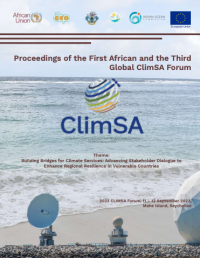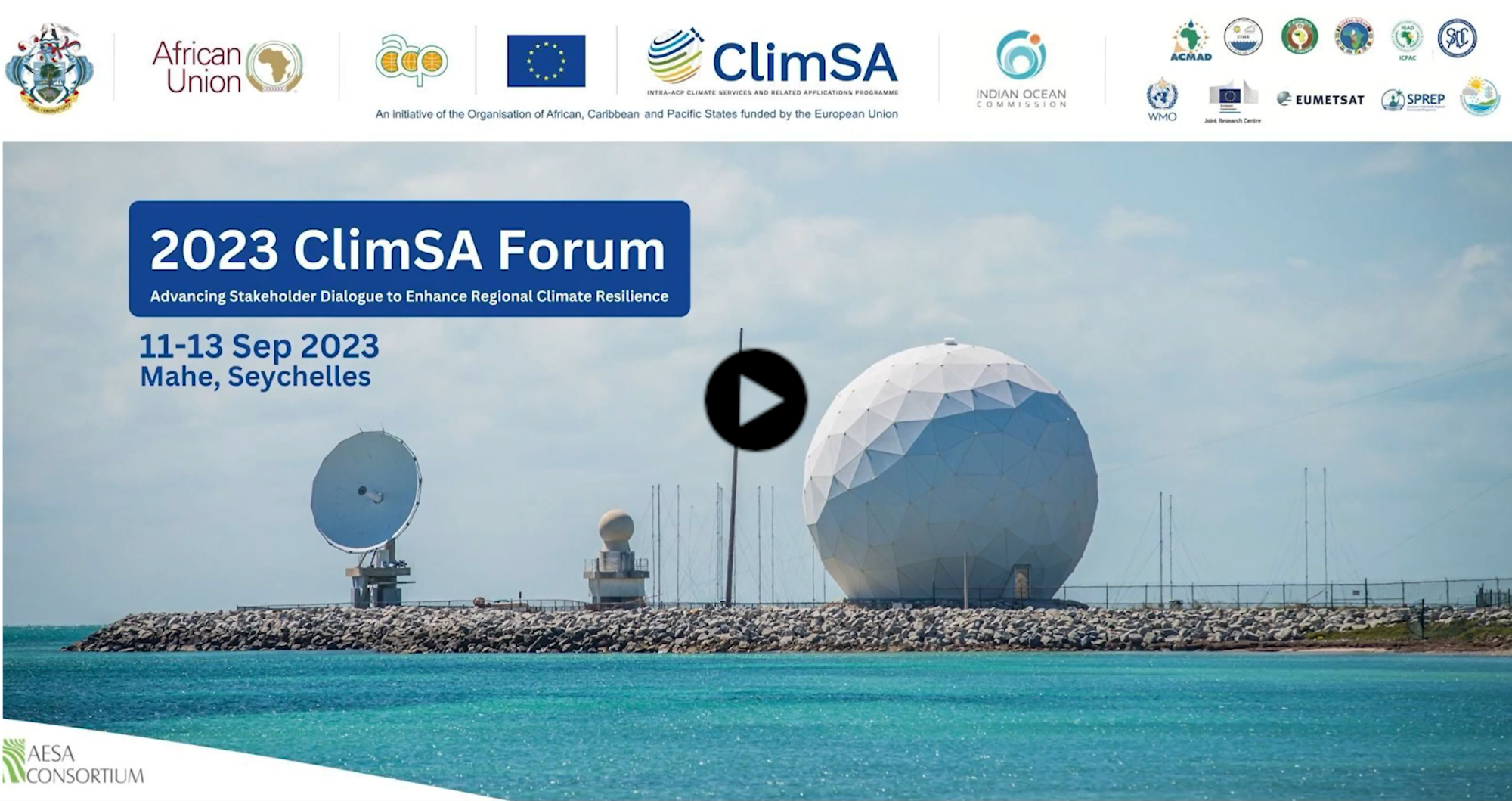
The proceedings summarize the First African and Third Global ClimSA Forum, focusing on enhancing regional resilience in vulnerable countries through climate services. The event, held in Seychelles, brought together stakeholders to discuss climate services' applications, stakeholder engagement, and the importance of dialogue in advancing inter and intra-regional resilience. Key themes included the development of decision-support tools, the role of climate services in disaster risk reduction, agriculture, water resources, and health, and the critical need for capacity building and data sharing to improve climate service delivery and use.
WATCH THE RECORDINGS
Watch the video of the Forum through the link below.
Building Bridges for Climate Services: Advancing Stakeholder Dialogue to Enhance Regional Resilience in Vulnerable Countries
Weekly programme
- DAY 1 (11/09/2023): Climate services frameworks and stakeholder dialogues for building resilience in OACPS regions
- DAY 2 (12/09/2023): Stakeholder sharing of experiences for strengthening regional and national capability to deliver and use climate services
- DAY 3 (13/09/2023): ClimSA contribution for building resilience in OACPS regions
Purpose, objectives and expected outcomes:
The purpose of the forum is to (i) build bridges between providers and users of climate services through the exchange of experiences and best practices stemming from the implementation of ClimSA programme, and learn about the contribution of stakeholder dialogue to enhance regional resilience in vulnerable countries.
The main objective is to raise awareness of the benefits of climate services for end-users in advancing dialogue among stakeholders through the mechanism of feedback, synergies and complementarities, particularly in relation to the operation of the RCCs and their Climate Services Information Systems. This will contribute to the sustainability of climate services generation, delivery and application, as well as to enhancing regional resilience in the most vulnerable countries in ACP regions.
For all enquiries, please contact Dr Nsadisa Faka (nsadisa.faka@acp.int) and Ernesto Rollando (ernesto.rollando@acp.int).
All times are Seychelles time (GMT+4)
Day 1
11 September 2023
Climate services frameworks and stakeholder dialogues for building resilience in OACPS regions
9h00 – 10h30
Opening Ceremony
-
Keynote Address & Remarks by AUC, IOC, EU
-
Keynote Address from the Government of Seychelles
-
Update on progress since the 2nd OACPS forum: Presentation of the status of implementation of the decisions and recommendations of the 2nd OACPS global forum
- Objectives and Expected Outcomes: Presentation of objectives and expected outcomes of the 3rd Annual (global) ClimSA Forum and 1st Africa ClimSA Forum
11h00 – 11h45
Session I
High-level Policy Dialogue/Roundtable
-
Contribution of ClimSA to African, Caribbean and Pacific (ACP) Regions’ development and climate action agendas: Synergizing strategies and policies for the sustainability of actions
-
Challenges and role of decision-makers in improving access to and generation, delivery and utilization of weather and climate services
11:45 - 12:45
Session II
Fundamental of climate services value chain
-
Climate services value chain: the elements that underpin the provision and application of climate services at the regional and national levels
-
ClimSA Capacity building strategy
Session III
Mechanism arrangement for the implementation of the framework
- The Global Framework for Climate Services (GFCS) and synergies with the Early Warnings for All (EW4All) initiative
- Continental and Regional Frameworks for Climate Services (RFCS) and regional sectoral user engagement/Regional Climate Outlook Forums (RCOFs) – good practices of RFCS implementation
- National Frameworks for Climate Services (NFCS) and National Climate Outlook Forums (NCOFs) – good practices & lessons learnt
14h00 – 16h15
Session IV
Regional Focus Country implementation status
-
ClimSA actions in the Regional Focus Countries: Expected outputs and level of implementation
- National ClimSA Focus Sector(s) – user engagement – experiences, lessons and opportunities
- Agriculture
- Water
- Health
- Energy
- Disaster Risk Reductio
16h30 – 17h30
Session V
Stakeholder engagement
- User feedback mechanism in the User Interface Platform (UIP)
- Case studies of Public-Private Engagement (PPE) in OACPS regions
Day 2
12 September 2023
Stakeholder sharing of experiences for strengthening regional and national capability to deliver and use climate services
9h15 – 12h45
Session I
RCCs' capacity to generate climate services (4 parallel sessions & plenary)
- Recap and Objectives: Overview of Day 1 and outline and expectations of Day 2
- Mandatory roles of RCCs: status of WMO designation, success, challenges and support received from Global Producing Centres (GPCs)
- Parallel sessions:
- Operational activities for long-range forecasts (LRF, both dynamic and statistical)
- Operational activities for climate monitoring
- Operational data services, to support operational LRF and climate monitoring
- Training in the use of operational RCC products and services
- Plenary of working group
13h45 – 14h45
Session II
RCCs Data/Products access from GPCs
- Summary of key gaps regarding ACP - RCC data and product requirements from GPCs
- WIGOS and GBON implementation & gaps
- GDPFS related gaps
- Review & progress of recommendations of workshop
- Proposed solutions
- JRC’s latest innovations and new datasets provided by the ClimSA Station
- WIS 2.0 – exchange of data (observations, model output, etc.) among GPCs, RCCs and NMHSs
- Data discovery access and retrieval
- Data exchange/sharing
- Gaps
- Proposed solutions
15h15 – 17h30
Session III
Effect of Climate Services added value in specific sectors
- Application of climate services in climate-sensitive sectors (4 parallel sessions & plenary)
- Water and Energy
- Disaster Risk Reduction
- Agriculture and Food Security & Fisheries
- Plenary session
Day 3
Wednesday, 13 September 2022
Theme: ClimSA contribution to building resilience in OACPS regions
9h00 – 12:45
Session I
Climate Services for Building Resilience
- Overview of Day 2 and outline and expectations of Day 3
- Contribution of ClimSA Technical Partners in building resilience in OACPS regions
- WMO
- JRC
- EUMETSAT
- Copernicus Climate Change Service / ECMWF
- The Copernicus Emergency Management Service (CEMS), which develops monitoring, forecasting, and impact assessment tools for droughts, floods, and fires
- Contributions and improvements of JRC thematic units (fisheries, water resources, agriculture, population and building distribution (GHSL))
- OACPS Training programme on:
- Climate service for renewable energy (CS4RE)
- Climate Smart Agriculture (CSA)
- The role of International Climate Assessment and Dataset (ICA&D): enabling RCCs to support the monitoring of national climate extremes.
BREAK
- Communication and Knowledge Management (KM) platform
- Feedback on the consultation with RCCs communication focal points: success stories, challenges & perspectives
- Regional KM groups
- Ownership & sustainability of the KM platform
14h00 – 15h00
Session II
Financing climate services for building resilience
- Climate finance for climate services market opportunities and challenges
- Supporting/leveraging Anticipatory Action (Forecast-based Financing FbF)
- Systematic Observations Financing Facility (SOFF) opportunity
- Climate Risk and Early Warning Systems (CREWS) imitative - complementarity with ClimSA and opportunities
- Support to climate services and energy.
15h00 – 15h30
Session III
Other studies
• OACPS MVRI study outputs
• Climate change attribution to recent and future climate extremes
16h00 – 16h45
Session IV
Synergy building and complementarities with other initiatives and programmes
- Contributions of ClimSA, to the African Strategy on Meteorology (Weather and Climate Services)
- GMES & Africa
- Climate change & GCCA+
- 11th EDF Intra-ACP Natural Disaster Risk Reduction Programme (NDRRP)
- WISER
- Great Green Wall (GGW) Initiative and other programmes promoting nature-based solutions.
-
Africa (Climate Change Adaptation and Resilience, Transboundary Water Management)
-
Initiatives from the Caribbean Region
-
Initiatives from the Pacific Region
-
Hydromet Project in IOC
16h45 – 17h15
Way forward
- Summary and next steps: Providing and applying climate services in the ACP sub-regions
- Empowering the user community – creating demand by users to ensure sustainability of climate services (engagement with organized regional, sub-regional and national sectoral user platforms, e.g., farmers platform, fisherfolks platform, etc.)
17h15 – 17h30
